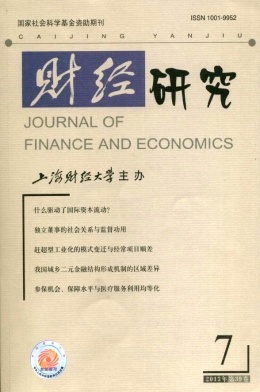危机冲击、损失规避与家族大股东支持效应
财经研究 2013 年 第 39 卷第 07 期, 页码:123 - 134
摘要
参考文献
摘要
文章基于前景理论的"损失规避"假说和"社会情感财富"假说,分析了危机冲击下的家族大股东行为选择动机及其对企业价值的影响。研究结果表明:当危机冲击到来时,家族大股东将家族社会情感财富的维持作为家族企业最主要的决策参照点,此时"损失规避"的家族大股东并未采取"掏空"的行为决策动机,而是发挥比国有大股东更强的支持效应。随着家族大股东持股水平的提升,危机冲击下家族大股东对基于所有权控制积累的"社会情感财富"的损失感知程度越强,在危机期间的家族大股东支持效应越明显;同时,对于处于低成长环境行业背景下的企业,家族大股东对所控制企业的"禀赋效应"更强,更能发挥支持效应,从而帮助企业渡过难关。
[1]贺小刚,连燕玲.家族权威与企业价值:基于家族上市公司的实证研究[J].经济研究,2009,(4):90-102.
[2]马永强,孟子平.金融危机冲击、企业风险缓冲与政府政策选择[J].会计研究,2009,(7):50-56.
[3]Bai C E,Liu Q,Song F M.Bad news is good news:Propping and tunneling evidencefrom China[R].Working Paper,The University of Hong Kong,2004.
[4]Bourgeois Lionel J.On the measurement of organizational slack[J].Academy of Man-agement Review,1981,6(1):29-39.
[5]Chua J H,Chrisman J J,Sharma P.Defining the family business by behavior[J].Entre-preneurship Theory and Practice,1999,23(4):19-39.
[6]Claessens S,Djankov S,Lang L H P.The separation of ownership and control in EastAsian corporations[J].Journal of Financial Economics,2000,58(1-2):81-112.
[7]Cohen J,Cohen P.Applied multiple regression/correlation analysis for the behavioralsciences[M].Hillsdale,NJ:Lawrence Erlbaum Associates,2003.
[8]Cyert Richard M,James G March.A behavioral theory of the firm[M].EnglewoodCliffs,NJ:Prentice-Hall,1963.
[9]David P,Hitt M A,Gimeno J.The influence of activism by institutional investors onR&D[J].The Academy of Management Journal,2001,44(1):144-157.
[10]Gillan S L,Starks L T.Corporate governance proposals and shareholder activism:The role ofinstitutional investors[J].Journal of Financial Economics,2000,57(2):275-305.
[11]Gomez-Mejia L R,Haynes K,Nunez-Nickel M,et al.Socioemotional wealth and busi-ness risks in family controlled firms:Evidence from Spanish olive oil mills[J].Adminis-trative Science Quarterly,2007,52(1):106-137.
[12]Hambrick D C.High profit strategies in mature capital goods industries:A contingen-cy approach[J].Academy of Management Journal,1983,26(4):687-707.
[13]Hambrick D C,Finkelstein S.Managerial discretion:A bridge between polar views onorganizational outcomes[A].Staw B M,Cummings L L.Research in organizational be-havior[C].Greenwich,CT:JAI Press,1987.
[14]Kahneman D,Tversky A.Prospect theory:An analysis of decision under risk[J].Econometrica,1979,47(2):263-292..
[15]La Porta R,L'opez-de-Silanes F,Shleifer A.Corporate ownership around the world[J].Journal of Finance,1999,54(2):471-518.
[16]La Porta R,L'opez-de-Silanes F,Shleifer A,et al.Investor protection and corporate gov-ernance[J].Journal of Financial Economics,2000,58(1-2):3-27.
[17]Lee T S,Yeh Y H.Corporate governance and financial distress:Evidence from Tai-wan[J].Corporate Governance:An International Review,2004,12(3):378-388...
[18]Pfeffer J,Salancik G R.The external control of organizations:A resource dependenceperspective[M].New York:Harper and Row,1978.
[19]Romanelli E,Tushman M L.Inertia,environments,and strategic choice:A quas-experi-mental design for comparative-longitudinal research[J].Management Science,1986,32(5):608-621.
[20]Shleifer A,Vishny R.A survey of corporate governance[J].Journal of Finance,1997,52(2):737-783.
[21]Shleifer A,Vishny R.Large shareholders and corporate control[J].Journal of PoliticalEconomy,1986,94(3):461-488.
[22]Tversky A,Kahneman D.Loss aversion in riskless choice:A reference-dependent[J].The Quarterly Journal of Economics,1991,106(4):1039-1061.
[2]马永强,孟子平.金融危机冲击、企业风险缓冲与政府政策选择[J].会计研究,2009,(7):50-56.
[3]Bai C E,Liu Q,Song F M.Bad news is good news:Propping and tunneling evidencefrom China[R].Working Paper,The University of Hong Kong,2004.
[4]Bourgeois Lionel J.On the measurement of organizational slack[J].Academy of Man-agement Review,1981,6(1):29-39.
[5]Chua J H,Chrisman J J,Sharma P.Defining the family business by behavior[J].Entre-preneurship Theory and Practice,1999,23(4):19-39.
[6]Claessens S,Djankov S,Lang L H P.The separation of ownership and control in EastAsian corporations[J].Journal of Financial Economics,2000,58(1-2):81-112.
[7]Cohen J,Cohen P.Applied multiple regression/correlation analysis for the behavioralsciences[M].Hillsdale,NJ:Lawrence Erlbaum Associates,2003.
[8]Cyert Richard M,James G March.A behavioral theory of the firm[M].EnglewoodCliffs,NJ:Prentice-Hall,1963.
[9]David P,Hitt M A,Gimeno J.The influence of activism by institutional investors onR&D[J].The Academy of Management Journal,2001,44(1):144-157.
[10]Gillan S L,Starks L T.Corporate governance proposals and shareholder activism:The role ofinstitutional investors[J].Journal of Financial Economics,2000,57(2):275-305.
[11]Gomez-Mejia L R,Haynes K,Nunez-Nickel M,et al.Socioemotional wealth and busi-ness risks in family controlled firms:Evidence from Spanish olive oil mills[J].Adminis-trative Science Quarterly,2007,52(1):106-137.
[12]Hambrick D C.High profit strategies in mature capital goods industries:A contingen-cy approach[J].Academy of Management Journal,1983,26(4):687-707.
[13]Hambrick D C,Finkelstein S.Managerial discretion:A bridge between polar views onorganizational outcomes[A].Staw B M,Cummings L L.Research in organizational be-havior[C].Greenwich,CT:JAI Press,1987.
[14]Kahneman D,Tversky A.Prospect theory:An analysis of decision under risk[J].Econometrica,1979,47(2):263-292..
[15]La Porta R,L'opez-de-Silanes F,Shleifer A.Corporate ownership around the world[J].Journal of Finance,1999,54(2):471-518.
[16]La Porta R,L'opez-de-Silanes F,Shleifer A,et al.Investor protection and corporate gov-ernance[J].Journal of Financial Economics,2000,58(1-2):3-27.
[17]Lee T S,Yeh Y H.Corporate governance and financial distress:Evidence from Tai-wan[J].Corporate Governance:An International Review,2004,12(3):378-388...
[18]Pfeffer J,Salancik G R.The external control of organizations:A resource dependenceperspective[M].New York:Harper and Row,1978.
[19]Romanelli E,Tushman M L.Inertia,environments,and strategic choice:A quas-experi-mental design for comparative-longitudinal research[J].Management Science,1986,32(5):608-621.
[20]Shleifer A,Vishny R.A survey of corporate governance[J].Journal of Finance,1997,52(2):737-783.
[21]Shleifer A,Vishny R.Large shareholders and corporate control[J].Journal of PoliticalEconomy,1986,94(3):461-488.
[22]Tversky A,Kahneman D.Loss aversion in riskless choice:A reference-dependent[J].The Quarterly Journal of Economics,1991,106(4):1039-1061.
引用本文
张远飞, 贺小刚, 连燕玲. 危机冲击、损失规避与家族大股东支持效应[J]. 财经研究, 2013, 39(7): 123–134.
导出参考文献,格式为:





 8546
8546  4505
4505

